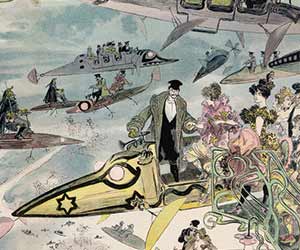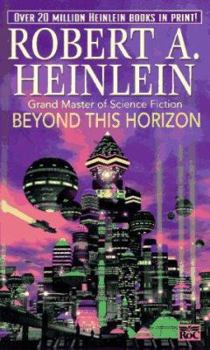Beyond this Horizon
Select Format
Select Condition 
Book Overview
Classic Heinlein. Short-sighted utopians in a futurist society recruit a disaffected "superior" man, and get far more than they bargain for. With an all new afterword by Tony Daniel. Utopia has been... This description may be from another edition of this product.
Format:Mass Market Paperback
Language:English
ISBN:0451166760
ISBN13:9780451166760
Release Date:December 1960
Publisher:Ace
Length:48 Pages
Weight:0.35 lbs.
Dimensions:7.0" x 0.8" x 4.3"
Customer Reviews
5 ratings
Good, Classic Work
Published by Thriftbooks.com User , 16 years ago
People who knock on this work as "the worst of Heinlein" obviously haven't taken time to understand it. This is a masterpiece. But it is a subtle masterpiece. If you buy this copy, I'd suggest you also check out the essay in the beginning of the "Gregg Press science fiction series" version. It explains some important details that the average reader may miss. Most prominently, it calls the readers attention to a particular transition that occurs on a particular page in the second half of the novel. Simply put, if you don't understand the transition, you haven't understood the book at all. I recommend you read it, and hang on for a great ride. But read it with care!
The Post-Utopian Blues
Published by Thriftbooks.com User , 21 years ago
Beyond This Horizon (1948) is a "post-utopian" novel. After the problem of world hunger, and all other issues of wealth distribution, have been solved, what problems will remain? If everybody is rich and healthy, what more could a rational person desire? In this novel, Hamilton Felix visits his friend, Monroe-Alpha Clifford, to show off his new pistol, a .45 caliber automatic, and then invites him out for dinner. As they dine on the balcony, Monroe-Alpha fumbles a crab leg, which slips from his fingers and lands in a drink on a table below, splashing purple liquid onto a woman's lap. Monroe-Alpha is called to task for the accident and apologizes, admitting his fault. However, another man chides him for his clumsiness and Hamilton does the honors, but only wounds the man in the shoulder. Unknown to Felix and his friend, the wounded man is an assassin for a group that believes that utopia lacks only one thing: a ruling class. The story goes on to detail the uncovering of this irrational plot and the eventual actions taken, including a shootout in the Genetics Clinic. The author draws upon the old saying, "man cannot live by bread alone", to point out that a material utopia will not settle all human issues. Such problems include not only the ambitions and aggressions passed on through our genes, but our higher aspirations for ourselves, for our families, and for the whole human race. This story is the author's first adult novel published in book form. He had been writing shorter works for the magazines for some time and two previous juvenile novels, but this was his masterwork, his proof that he could sell in the adult book market. There is very little that is dated in this story (one editorial review commented on the dialogue as dated, but maybe retro was in again). In fact, his depiction of the eugenics program has the look and feel of modern genetic engineering; of course, the author doesn't dwell on the details, but the ways and means seem very contemporary. This novel has never been acclaimed as much as others, such as Stranger In a Strange Land, that attracted the attention of a wider, but less knowledgeable, audience. Maybe it came before its time, for the topics discussed herein are more apropos today than 60 years ago. One of the possibilities of the post-ColdWar era is the development of a worldwide material utopia. Would that solve all our current problems? Are you certain? This reprint has a 2001: A Space Odyssey starchild on the cover. Some people don't know a Heinlein from a Clarke! And probably not even a hawk from a handsaw! Highly recommended to Heinlein fans and anyone who enjoys the serious contemplation of the unthinkable in a SF setting. -Arthur W. Jordin
Beyond this Horizon blows away Brave New World, hands down.
Published by Thriftbooks.com User , 25 years ago
In this short Heinlein work, the possibilities of, and consequences in, a society that evolves around genetic engineering are explored in a much more interesting, and I believe more realistic, manner than Huxley's Brave New World. The book is especially vital in today's atmosphere of cloning and rigorous work with the human genome. It is all the more amazing considering that the book was written in 1942. If and when this book becomes available, I highly recommend it.
One of the best Science Fiction novels ever written
Published by Thriftbooks.com User , 26 years ago
Though many of the other comments on this book have been critical: that it goes way too fast, has little plot,is one of Heinlein's weaker books, I can assure potential readers that this is one of the best Science Fiction novels ever written. Heinlein manages to write a novel that not only has charming characters, but also manages to be bursting with really cool ideas (especially considering that this novel was written in the 40's). He takes on subjects which we just today are starting to discuss seriously, the most obvious one being genetic engineering, and gives his view of how society adapts to it. He also provides (as with all Heinlein books) some interesting social commentary (in this novel he seems to endorse a republic where the citizens police themselves). And though, as critics are quick to point out, this novel has many different plot lines (some of which do not begin until around half way through the book). Any experienced reader who has surpassed the Piers Anthony level should be able to follow what is going on as long as they take the time to read the book properly.
Heinlein's talent obvious in first novel
Published by Thriftbooks.com User , 27 years ago
Elsewhere I had heard this rated as one of science-fiction's classics of the forties, and so, upon seeing it in the store, I figured "what the heck" and decided to go for it. As usual, Heinlein never fails to disappoint, and this book is crammed with so many ideas that you lose count after a while. Heinlein made a neat twist by making the world perfect and everybody happy, and still managing to get a passable plot out of all that. Beyond This Horizon is a nice middle ground between those who find his "kiddie" books like Have Spacesuit, Will Travel too simple and his more adult books like Stranger in A Strange Land and The Moon is a Harsh Mistress a little too radical. One thing I find interesting, as a little aside, is that when publishers right copy for the summary's on the back of his novels, they often neglect the best parts of the book. On Have Spacesuit, Will Travel, it makes great mention of the pirates, but nothing at all of the trial of Earth that came later and took up a good portion of the book. It's the same case here, with all the focus on the revolt of the Survivor's Club, which is resolved about the middle of the book, and nothing on the issues that are discussed later. The point is here, when looking at a Heinlein book, or any book, don't always go by what the back cover says. Just another public service announcement. But, seriously, this was a great book. Read it
Beyond This Horizon Mentions in Our Blog

Herbert & Heinlein
Published by William Shelton • March 12, 2021
The genre of science fiction writing has two great pillars representing the wonder and promise of future worlds, and the intricate technology as yet unimagined, except by their questing minds. Frank Herbert and Robert Heinlein were contemporaries who saw sci-fi through these different lenses.






